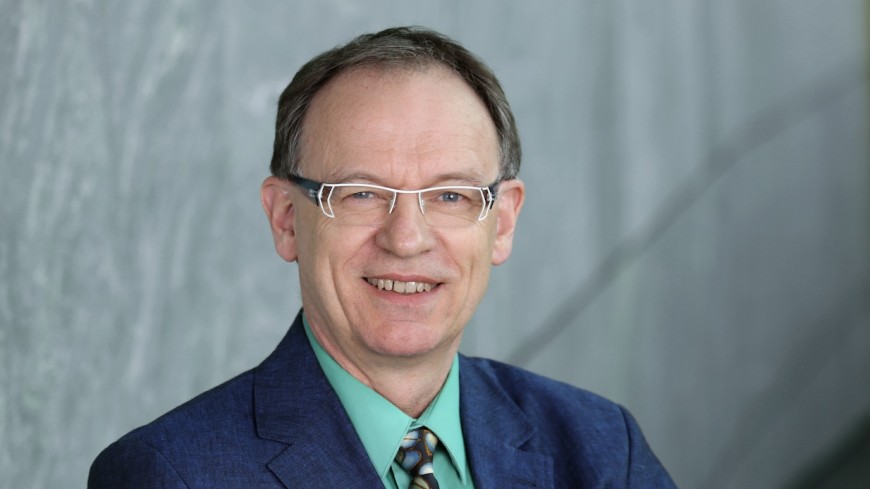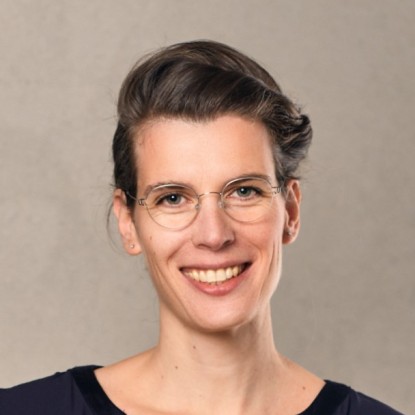Putting Humans at the Center
An interview with Prof. Dr. Max Mühlhäuser
2024/06/12 by Astrid Ludwig
Professor Max Mühlhäuser is one of the pioneers in the field of ubiquitous computing, the ubiquity of computers and the networking of systems. A professor at the Department of Computer Science, he has set standards in UC research in Europe. The computer scientist has been teaching and researching at TU Darmstadt for almost 25 years. He will soon be retiring, but with rapid developments in artificial intelligence, augmented reality, data misuse and the threat of cyber-attacks, he intends to remain involved in research.

What would Max Mühlhäuser have done if he had followed his first passion? After leaving school in Pforzheim, Germany, the now 67-year-old was undecided. “I actually considered studying music and piano,” he says. So he might have become a successful concert pianist or music teacher? Luckily, there was this terrible book on computer science that his father had given him in the mid-1970s because of his son's interest in the nascent discipline. “This book annoyed me so much that I wanted to know more about it afterwards,” Max Mühlhäuser recalls with a grin.
One of the first researchers into hypertext and information networking
In its early years, computer science consisted of punched cards and cupboard-sized computers that took days to calculate what today's systems can do in seconds. In his five decades as a scientist, the TU professor has witnessed all the advances in his field of research at first hand and has helped to develop and shape some of them. “I started when the Internet was being painstakingly created,” he says. Mühlhäuser was one of the first researchers to work on hypertext and the networking of information. His research in the 1980s found its way into innovative systems for computer-aided learning, among other things, even before the foundations for the World Wide Web and HTML were laid at CERN in Geneva.
In 1986, after completing his studies and doctorate at the University of Karlsruhe (now KIT), Max Mühlhäuser founded the “Campus based Engineering Center” (CEC) in Karlsruhe, the first European research centre of the then second-largest computer manufacturer, DEC. “It was a gold rush at the time, a great time,” he recalls fondly. The world of computing was still small, good ideas were taken up and established“. Three years later, he founded TECO, the Telecooperation Office, in Karlsruhe, where, as a young scientist, he was already setting standards in ubiquitous computing research in Europe.
Neurons that form a brain and lead to an explosion of capabilities
Ubiquitous computing, or UC, ”is a rather unwieldy term,“ says Mühlhäuser. It refers to the ubiquity of multiple computers in our lives. Back in the late 1980s and early 1990s, pioneers such as Mark Weiser in the US had a vision of replacing the individual computer with a multitude of computers that would unobtrusively support people in their everyday lives. The proliferation of computers was to be accompanied by their virtual disappearance from our consciousness. According to Mühlhäuser, this vision is not sufficiently reflected in the term ”Internet of Things“. The TU professor compares the networking of systems to ”neurons that come together to form a brain and lead to an explosion of capabilities“. This is probably what fascinates him so much. For him as a researcher, however, interaction with people played an important role right from the start. ”For me, networked systems immediately bring the user into play, and therefore their protection in a digitalised world.
This interest led him to become a professor at the TU Darmstadt and the Department of Computer Science in 2000, where he has since headed the Telecooperation Lab, researching an intelligent and secure ubiquitous computing environment with a human-centred approach. This means that Mühlhäuser and his team deal with networked systems, human-computer interaction, protection and security, and applied AI. His interest in security and privacy led him to become a member of the board of directors of CASED, the former LOEWE Centre for IT Security Research and Development, and its successor, the National Research Centre for Applied Cybersecurity ATHENE.
Focus on Trustworthy Systems and Mechanisms
In a rapidly changing digital world and geopolitical order, Mühlhäuser's work focuses on trustworthy systems and mechanisms. In the face of cyber-attacks, the increasing loss of sovereignty/autonomy or control by users, data theft and ever new possibilities for manipulation, research into protection and resilience is becoming increasingly important to him. “The world has become insecure and disruptive due to crises and disasters caused by climate change, geopolitical tensions and hybrid warfare, destabilisation of democracies, misinformation and disinformation – we and IT are not sufficiently prepared,” he warns. The TU professor advises that more should be invested and researched into infrastructure protection, for example. There must be more decentralised approaches and isolated solutions, fewer interdependencies instead of more, a plan B in the event of damage and disasters – for electricity, heating, food, finances and much more. “This will keep us very busy in the coming years,” he is sure.
A determined fight for a democratic society
The huge potential of artificial intelligence is the subject of intense research in his department. However, he sees a danger that AI could come full circle from spying and screening people to manipulating them. There are thousands and thousands of chatbots on the internet that try to manipulate, radicalise or misinform. Deep fakes are also becoming more powerful in their attempts to destabilise democratic society. “As researchers, we need to be even more determined in our fight against this,” warns Prof. Max Mühlhäuser.
A climate of freedom and appreciation for young researchers
Are there any achievements in his long career of which he is particularly proud? The man from Pforzheim is modest. “We have always achieved our research successes as a team or in a group,” he emphasises. What he is proud of, however, is “working with people”. He has guided some 80 doctoral students to their PhDs and some 30 young scientists to the title of professor. “I am still in touch with many of them. That makes me very happy. The working atmosphere in his department has always been very important to him: ”There is a spirit of freedom and appreciation, and a climate for young researchers in which they can develop.“
His term of office ends with the summer semester. ”But I'm not going to stop completely," he emphasises. The TU professor is thinking of a gradual rather than an abrupt end. He wants to continue doing special research. As a future grandfather, however, he is looking forward to having more space for his family and his piano. He admits, however, that he is still getting used to the feeling of suddenly having more time on his hands.
Short Biography
Professorships
- 2000 bis 2024 Full Professor TU Darmstadt,
Telecooperation Lab - 1995–1999 Full Professor University Linz
- 1992–1994 Professor (C3) Universität Karlsruhe
- 1989–1992 Professor (C3) Universität Kaiserslautern
Education
- 1986 Doctotare Universität Karlsruhe, Highest Distinction (summa cum laude)
Selected Positions
- Dean from 2016-2018 and 2002-2004
- Vice Dean from 2014-2016 and 2001-2002
- Speaker DFG Research Training School Privacy and Trust since 2015
- Deputy Speaker and later PI of Collaborative Research Center MAKI
- PI at ATHENE National Research Center for Applied Cybersecurity
- Co-Director of CASED LOEWE-Center for Advanced Security Research CASED (2008 – 2016)
Selected Honors and Awards
- Member, acatech German Academy of Tech. Sciences (since 2016)
- Adjunct Professor, Queensland Univ. of Technology
- IBM UIMA Award
- European Multimedia Award
- Director of Honor, CEC Karlsruhe
- Member, German National Academic Foundation


